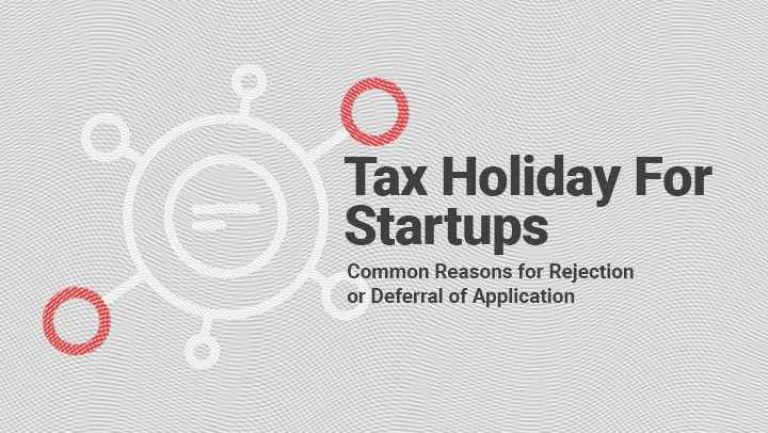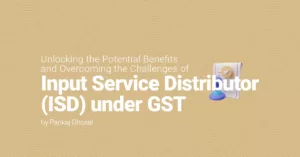This article discusses our practical experience of obtaining tax holiday certificates for startups and some of the common reasons of rejection or deferral by the inter-ministerial board.
Introduction
When should one apply for Tax Holiday ?
Startups, like most traditional businesses, take time to break even, and even more time to start earning profits. The economics of each startup depends on the nature of industry it operates in, but, in general, the focus is to penetrate the market in the initial years and then focus on profitability.
Given the above, should a startup apply for the tax holiday certificate at the earliest post its incorporation or only when it has a visibility of earning profits within 10 years of its incorporation?
In our opinion, it is better to apply and get the tax holiday certificate issued as soon as a startup is incorporated even if it does not have any visibility of earning profits in the near future. This is for the reason that there is no downside of obtaining the tax holiday certificate and not utilizing it, just in case the startup does not turn profitable within first 10 years of its existence.
Process of Application
A startup is required to file an application with the inter-ministerial board (‘IMB’)2 , and only on grant of such exemption, it can avail exemption in its return of income (‘ITR’). The application is required to be filed online with all the necessary information including legal name, incorporation details, DPIIT recognition number, etc. The supporting documents include constitution documents of the startup (memorandum of association/LLP deed), audited financial statements of last 3 years and copy of return of income of last 3 years.
Details Required To Be Submitted Along With The application
In addition to the documents mentioned above, a startup is also required to complete a detailed questionnaire and a short video explaining the product/service the startup deals in. Guidelines for preparing a detailed video can be found here.
Application Evaluation
The application shall be first evaluated by the technical team of startup India followed by evaluation by the IMB. Considering the inputs from the technical team, the IMB decides whether to grant approval or not. The IMB is not bound to accept the recommendations of the technical agency. The IMB meeting usually takes place every four weeks from the date of last meeting.
Common Reasons For Rejecting Or Deferring The Applications By Inter-Ministerial Board
Based on our experience of assisting startups in applying for tax holiday exemption under section (‘u/s’) 80-IAC of the Income-tax Act, 1961 (‘the Act’), some of the common reasons of rejection/deferral are as under:
Reasons For Rejection
-
Product/service is not innovative;
-
Similar product/service already available in market;
-
Reconstruction of existing business, i.e., startup carrying out business which was already carried out by it through another entity and the startup is solely formed to avail benefits under the Startup India scheme which includes tax holiday.
Reasons For Deferral
-
Startup is yet to gain traction in the market;
-
Until the required clearances/approvals are obtained. For example: If the business plan is contingent upon certain approvals from any relevant agency then the application is put on hold and reconsidered upon receiving such approval.
Additionally, in case the IMB or the technical agency feels that they require certain factual clarifications, they raise their queries for the startup to address and then take forward the application upon startups’ adequate response to their queries.
Closing Remarks
One should be wary of the fact that the specified conditions of availing this exemption are duly complied with and the startup applying for the exemption should be dealing in product or service which is innovative. Furthermore, the business should be completely new and not be constituted out of existing business only to avail the benefits available to startups
The IMB is quite diligent in analysing the applications and each application is accepted or rejected with detailed valid reasons. In case any startup applicant does not agree to the reasons of rejection given by the IMB, it can file its justification for the IMB to reconsider.
Overall, the IMB is functioning well, and the applications are disposed off within a reasonable timeframe.
1. DPIIT – Department for Promotion of Industry and Internal Trade
2. IMB comprises representatives from various ministries, department and authorities including Ministry of Electronics and Information Technology (MeitY), Ministry of Corporate Affairs, Central Board of Direct Taxes, Reserve Bank of India, Securities and Exchange Board of India, Department of Biotechnology, National Research Development Corporation, Department of Science & Technology
Karnik Gulati
assisted by Dheeraj Jha














